On the Bookshelf
A remarkable number of books penned or edited by members of the McGill Law community hit the book stands in 2016 and the first few months of 2017. We’ve tallied 16 here, and more are forthcoming.
From investor-state arbitration, marital rights, and property law, to fiduciary law, human rights, and health law, these monographs and edited volumes bespeak the vigorous intellectual life of our Faculty.
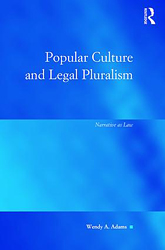 Wendy Adams, Popular Culture and Legal Pluralism – Narrative as Law, Routledge, 2017. Wendy Adams, Popular Culture and Legal Pluralism – Narrative as Law, Routledge, 2017.
Drawing upon theories of critical legal pluralism and psychological theories of narrative identity, Adams argues for an understanding of popular culture as legal authority, unmediated by translation into state law…
|
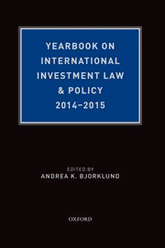 Andrea K. Bjorklund, ed., 2014-2015 Yearbook on International Investment Law and Policy, Oxford University Press, 2016. Andrea K. Bjorklund, ed., 2014-2015 Yearbook on International Investment Law and Policy, Oxford University Press, 2016.
This annual publication provides an overview of current developments in the global international investment law and policy field.
|
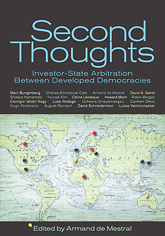 Armand de Mestral, ed. Second Thoughts. Investor State Arbitration between Developed Democracies, McGill-Queen’s University Press, March 2017. Armand de Mestral, ed. Second Thoughts. Investor State Arbitration between Developed Democracies, McGill-Queen’s University Press, March 2017.
International investment experts provide thoughts on investor-state arbitration in Canada and other parts of the world and its place between developed democracies.
|
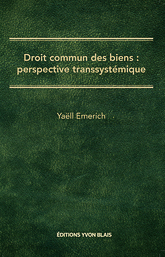 Yaëll Emerich: Droit commun des biens : perspective transsystémique, Yvon Blais, 2017. Yaëll Emerich: Droit commun des biens : perspective transsystémique, Yvon Blais, 2017.Un dialogue entre les traditions juridiques, visant à en faire ressortir l’unité à travers leur diversité, cet ouvrage incontournable est une réflexion sur ce qui est commun aux différentes traditions juridiques, au-delà de leurs différences. |
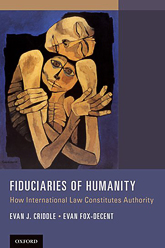 Evan Fox-Decent & Evan Criddle, Fiduciaries of Humanity. How International Law Constitutes Authority, Oxford University Press, 2016. Evan Fox-Decent & Evan Criddle, Fiduciaries of Humanity. How International Law Constitutes Authority, Oxford University Press, 2016.
Public international law has embarked on a new chapter. Over the past century, the classical model of international law, which emphasized state autonomy and interstate relations, has gradually ceded ground to a new model. Under the new model, a state’s sovereign authority arises from the state’s responsibility to respect, protect, and fulfill human rights for its people…
|
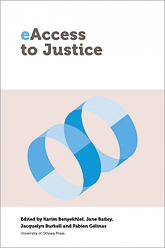 Fabien Gélinas, Karim Benyekhlef, Jane Bailey & Jacquelyn Burkell, eds., eAccess to Justice, University of Ottawa Press. Fabien Gélinas, Karim Benyekhlef, Jane Bailey & Jacquelyn Burkell, eds., eAccess to Justice, University of Ottawa Press.
Part I of this work focuses on the ways in which digitization projects can affect fundamental justice principles. Part II examines the implementation of technologies in the justice system and the challenges it comes with. Part III adopts the standpoints of sociology, political theory and legal theory to explore the complex web of values, norms, and practices that support our systems of justice.
|
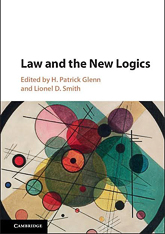 H. Patrick Glenn & Lionel Smith, eds. Law and the New Logics, Cambridge University Press, 2017. H. Patrick Glenn & Lionel Smith, eds. Law and the New Logics, Cambridge University Press, 2017.
An interdisciplinary conversation between jurists and logicians, this unique book brings together scholars from both law and philosophy and looks at the application of ‘the new logics’ to law and legal ordering, in a number of legal systems.
|
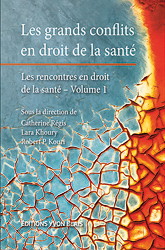 Lara Khoury, Catherine Régis & Robert Kouri, dir., Les grands conflits en droit de la santé, Yvon Blais, 2016. Lara Khoury, Catherine Régis & Robert Kouri, dir., Les grands conflits en droit de la santé, Yvon Blais, 2016.
En novembre 2014, des chercheurs canadiens, suisses et français étaient invités à identifier un conflit d’actualité et significatif en droit de la santé afin d’en discuter de manière approfondie. Des sujets aussi riches que variés ont été abordés à cette occasion et sont ici réunis.
|
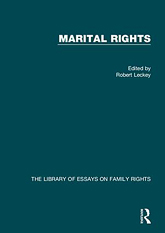 Robert Leckey, ed., Marital Rights, Routledge, 2017. Robert Leckey, ed., Marital Rights, Routledge, 2017.
This volume gathers influential scholarship on the international and domestic rights attaching to married couples and other adult relationships… it traces contentious debates about the content of marital rights and responsibilities and whether law should reach beyond marriage, and if so how.
|
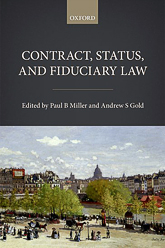 Paul B. Miller & Andrew S. Gold, eds., Contract, Status, and Fiduciary Law, Oxford University Press, 2016. Paul B. Miller & Andrew S. Gold, eds., Contract, Status, and Fiduciary Law, Oxford University Press, 2016.
Covering a range of topics related to contract and fiduciary law including legal doctrine, contract theory, fiducial theory, moral philosophy, and political philosophy, this volume demonstrates that contract and fiduciary law, while distinctive, are deeply intertwined.
|
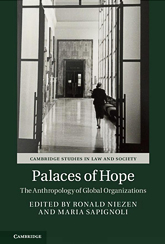 Rod Niezen & Maria Sapignoli, eds., Palaces of Hope – The Anthropology of Global Organizations, Cambridge University Press, 2017. Rod Niezen & Maria Sapignoli, eds., Palaces of Hope – The Anthropology of Global Organizations, Cambridge University Press, 2017.
This volume assembles the work of scholars who are making key contributions to a new approach to the UN, and to global organizations and international law more generally. Anthropology has in recent years taken on global organizations as a legitimate source of its subject matter. The research that is being done in this field gives a human face to these world-reforming institutions.
|
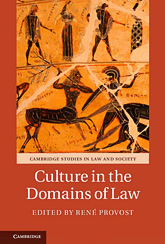 René Provost, ed., Culture in the Domains of Law, Cambridge University Press, 2016. René Provost, ed., Culture in the Domains of Law, Cambridge University Press, 2016.
What does it mean for courts and other legal institutions to be culturally sensitive? What are the institutional implications and consequences? To what extent is legal discourse capable of accommodating multiple cultural narratives without losing its claim to normative specificity? And how are we to understand meetings of law and culture in the context of formal and informal legal processes, when demands are made to accommodate cultural difference?
|
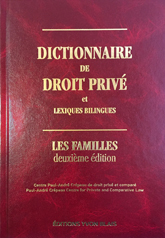 Paul-André Crépeau Centre for Private and Comparative Law, Dictionnaire de droit privé et lexiques bilingues – Les familles, 2e éd., and Private Law Dictionary and Bilingual Lexicons – Family, 2nd ed., Yvon Blais, 2016. Paul-André Crépeau Centre for Private and Comparative Law, Dictionnaire de droit privé et lexiques bilingues – Les familles, 2e éd., and Private Law Dictionary and Bilingual Lexicons – Family, 2nd ed., Yvon Blais, 2016.
Depuis deux décennies, les rédacteurs législatifs, juges, notaires, avocats, auteurs de doctrine et, bien sûr, les familles elles-mêmes ont pris des mesures – ou ont choisi de ne pas le faire – qui ont redéfini les frontières normatives de la vie familiale au Québec. Quel est l’impact de ces transformations sur le vocabulaire juridique ?
|
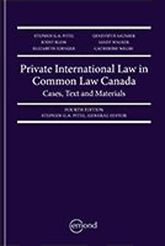 Geneviève Saumier, Catherine Walsh et al., eds, Private International Law in Common Law Canada: Cases, Text and Materials, 4th ed., Emond-Montgomery, 2016. Geneviève Saumier, Catherine Walsh et al., eds, Private International Law in Common Law Canada: Cases, Text and Materials, 4th ed., Emond-Montgomery, 2016.
…examines the three key issues in civil litigation: taking jurisdiction over a dispute, recognizing and enforcing judgment of a foreign court, and identifying the law to be applied in resolving a dispute… also investigates the historical and theoretical underpinnings of private international law, exploring its constitutional implications and its intersections with public policy.
|
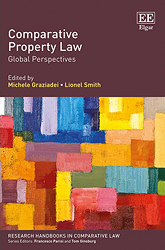 Lionel Smith & Michele Graziadei, eds. Comparative Property Law: Global Perspectives, E. Elgar, 2017. Lionel Smith & Michele Graziadei, eds. Comparative Property Law: Global Perspectives, E. Elgar, 2017.
Comparative Property Law provides a comprehensive treatment of property law from a comparative and global perspective. The contributors, who are leading experts in their fields, cover both classical and new subjects, including the transfer of property, the public-private divide in property law, water and forest laws, and the property rights of aboriginal peoples.
|
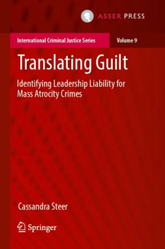 Cassandra Steer, Translating Guilt: Identifying Leadership Liability for Mass Atrocity Crimes, TMC Asser Press/Springer, 2017. Cassandra Steer, Translating Guilt: Identifying Leadership Liability for Mass Atrocity Crimes, TMC Asser Press/Springer, 2017.
This book seeks to understand how and why we should hold leaders responsible for the collective mass atrocities that are committed in times of conflict. It attempts to untangle the debates on modes of liability in international criminal law that have become truly complex over the last twenty years, and to provide a way to identify the most appropriate model for leadership liability.
|
